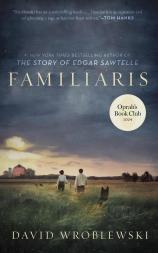Reading Group Guide
Discussion Questions
Familiaris

1. In the prologue, David Wroblewski writes, "The same would be true for each of the great quests in John Sawtelle's life." How would you describe the great quests in John Sawtelle's life?
2. Mary is the strong, sensible, joyful backbone of the Sawtelle farm. She is talented at rerouting a conversation or course of action to a better result --- at times she is an agitator, at times a peacekeeper. Which events of the book are changed by her intervention?
3. John often uses the prompt "Suppose you could do one impossible thing." This phrase becomes his ethos for approaching life's challenges. How does each character interpret it?
4. The text Practical Agriculture and Free Will by the fictional thinker George Solomon Drencher turns up regularly in FAMILIARIS, quoted sincerely by John and as a punch line by others. The characters are amused by the book's overblown verbosity, but they do find guidance in its passages. How does the book unify the characters' life stages? Did any Drencherian quotes stand out to you for their strange practicality?
5. Throughout the novel, So Jack encourages many characters to have heart-to-heart conversations with Granddaddy. Why? How do characters benefit from these conversations?
6. John, Mary, Gar and Claude are a family of extremely talented dog trainers, and the reader gets a detailed look at that process. Did any aspects of their work surprise you?
7. How does the author differentiate each canine character from the others?
8. Watching the Sawtelles and their friends over decades explores the broader contours of life experience --- starting with their big dreams as they seek what Drencher would call their "singularism." Do you feel that the characters achieved a version of their dreams? Would Drencher say so?
9. For those readers who have also read Wroblewski's debut novel, THE STORY OF EDGAR SAWTELLE, how did the events of FAMILIARIS enhance your understanding of Gar and Claude's relationship and their family history?
10. Do you have a favorite canine character in FAMILIARIS? Do any remind you of a dog that has been part of your life?
11.The friendship between John and Frank is tested throughout the book. How does the dynamic change over the course of their lives?
12. The Peshtigo fire was a real event that occurred in Wisconsin on October 8, 1871. Its place in history is overshadowed by the Great Chicago Fire, which started on the very same day. Had you heard of the Peshtigo fire before reading FAMILIARIS?
13. The part-human, part-supernatural character known to the Sawtelles as Ida Paine powerfully redirects several events, changing their outcomes and effectively turning back time. Do you see Ida as a force for good, or something more complicated?
14. In your opinion, what does Ida want? What does Nyx want? Do they work together, or are they often at cross purposes? Who is in control?
15. If you could have a conversation with your younger self and your older self, as John does with Ida's help in Part III, what would you want to say?
16. The categories the Sawtelles use to classify their dogs --- Searcher, Consoler, Challenger, Defender --- can also be used to describe the human characters in the story. How would you assign these? Do some apply to more than one character?
17. There are many pair-wise relationships in the novel: John and Mary, of course, but also So Jack and Granddaddy, John and Elbow, Walter and Ida, etc. How can each of these be thought of as a love story?
18. What is Elbow's relationship to wood? How does his work speak for him? Similarly, what about Frank's relationship to food?
19. At the end of Part III, John dreams of the first dogs who lived alongside humans. What does this dream mean to you? What do you think it means to John?
20. Claude brings chaos and deceit to his relationships. In your opinion, does his darkness come from within or without, and is this universal?
21. Why does Claude decide to leave at the end of Part IV? What might he fear about staying?
22. What does the novel say to you about friendship? What about love? Grief?
23. Think about active mourning versus passive mourning, especially as it relates to John.
24. Compare John's time at the rooming house with his time at the farm. What kind of community does John create in each place?
25. What does it tell you about John's character that he never tells Frank the truth about the necker knob? Do you think Frank knows this, consciously or unconsciously?
26. Which character do you most relate to, and why?
27. Discuss the following terms: agency, choice, fate, optimism, creation, knowledge, yearning, loss. How are these manifested across the scope of the novel?
Familiaris
- Publication Date: June 11, 2024
- Genres: Fiction, Historical Fiction
- Hardcover: 992 pages
- Publisher: Blackstone Publishing
- ISBN-10: B0CLF6YZYX
- ISBN-13: 9798212194297







